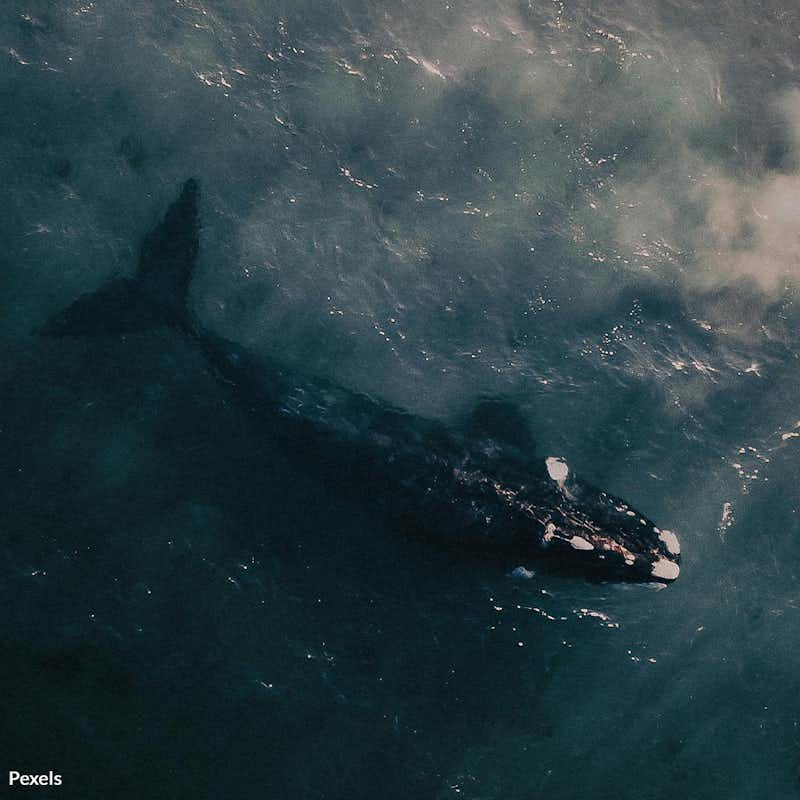Stop Industrial Krill Fishing From Starving Whales To Death
7,709 signatures toward our 30,000 Goal
Sponsor: The Animal Rescue Site
Whales are in danger as industrial krill fishing threatens their survival. Act now to protect their only food source and prevent these majestic creatures from being driven to extinction.

In the icy waters of the Southern Ocean, whales are battling for their survival. After decades of recovery from industrial whaling, these majestic creatures now face a new, unexpected threat: the booming demand for krill. These tiny shrimp-like crustaceans are the whales' primary source of food, and without them, their future is in jeopardy.
Krill, once harvested mainly for fish farms, is now in high demand for omega-3 supplements. This demand has quadrupled krill fishing in the past two decades1. As industrial trawlers scour the same waters where whales feed, we are witnessing an alarming overlap between human activities and whale feeding grounds2. The whales, including critically endangered species like the Antarctic blue whale, are left competing for their very survival.
The Role of Krill in the Ocean Ecosystem
Krill may be tiny, but their impact on the Antarctic ecosystem is immense. A single whale can consume up to six tons of krill each day3, using these tiny creatures to build the energy reserves needed for migration, breeding, and population recovery. Without krill, whales simply cannot thrive.
The ripple effects of declining krill populations extend far beyond whales. Penguins, seals, seabirds, and countless other species depend on krill for survival4. Krill also play a crucial role in regulating global carbon levels by sequestering carbon dioxide during their lifecycle3. In short, the future of the Southern Ocean’s entire food web—and the health of our planet—is tied to the fate of krill.
An Unsustainable Harvest
In 2022 alone, more than 400,000 tons of krill were harvested from the Southern Ocean5. This industrial-scale fishing directly impacts whale populations already struggling to recover from centuries of hunting. Whales and fishing boats are now fighting for the same dense swarms of krill1, and experts warn that there simply isn’t enough to sustain both the growing human demand and the whales’ recovery2.
Adding to the crisis, whales are being physically endangered by industrial fishing operations. Several humpback whales have already been killed after becoming entangled in krill fishing nets2. With the situation growing more dire by the day, we cannot afford to stand by as whales are pushed closer to extinction by human activity.
Take Action Before It’s Too Late
The future of our planet’s whales is in our hands. The Commission for the Conservation of Antarctic Marine Living Resources (CCAMLR) is scheduled to review krill catch limits soon, and there is an urgent need to demand stricter regulations that protect whale feeding grounds and account for the krill prey requirements that these species need to survive.
Sign the petition and help push for regulations that protect whales and ensure a sustainable future for the entire Antarctic ecosystem. Together, we can prevent industrial fishing from undoing decades of progress in whale conservation and protect these magnificent creatures before it’s too late.
- Fast Company (14 September 2024), "Whales Endangered by Growing Krill Fishing Threat."
- Stanford University News (10 September 2024), "Krill Harvesting Threatens Whale Recovery."
- Oceana, "Antarctic Krill and the Food Web."
- Laura Baisas, Popular Science (10 September 2024), "Whales Need Krill to Survive."
- Yvaine Ye, CU Boulder Today (11 September 2024), "Increased Krill Fishing Threatens Whale Comeback."
The Petition:
To the Executive Secretary of the Commission for the Conservation of Antarctic Marine Living Resources (CCAMLR),
We, the undersigned, call on the Commission for the Conservation of Antarctic Marine Living Resources (CCAMLR) to implement stricter regulations on krill fishing in the Southern Ocean to ensure the survival and recovery of whale populations.
Whales, once hunted to near extinction, are now facing a new and pressing threat. Industrial krill fishing, driven by demand for fish feed and omega-3 supplements, directly competes with whales for their primary food source. These tiny crustaceans, krill, are critical for baleen whales such as humpbacks, blue whales, and fin whales, which consume up to six tons of krill each day. Without sufficient krill, these whales cannot build the energy reserves necessary for migration, breeding, and population recovery.
In recent years, krill fishing has quadrupled, and the overlap between industrial trawlers and whale feeding grounds has reached critical levels. Studies show that krill populations are significantly lower than they were before industrial whaling, leaving little room for both a thriving fishery and recovering whale populations. Further, whales have been entangled in krill fishing nets, resulting in tragic deaths that emphasize the urgent need for better management.
We urge the CCAMLR to take immediate action by introducing regulations that account for whale prey requirements when determining krill catch limits. This can be achieved by:
- Implementing precautionary measures to reduce competition between krill fisheries and whales.
- Establishing marine protected areas where industrial krill fishing is prohibited in key whale feeding regions.
- Ensuring that catch limits reflect the need to preserve krill for the entire Southern Ocean ecosystem, not just human consumption.
Protecting krill is not only vital for whales but also for the overall health of the Antarctic marine ecosystem. Seals, penguins, and seabirds also rely on krill, and its role in regulating global carbon levels further emphasizes the importance of sustainable management.
By taking decisive action, the CCAMLR can ensure a balanced future where both whales and sustainable krill fisheries coexist. We believe that conservation measures to protect krill and, by extension, the whales that depend on them, will lead to a healthier ocean and a better future for all species, including humans.
Thank you for your attention and commitment to protecting our planet’s most vulnerable species.
Sincerely,